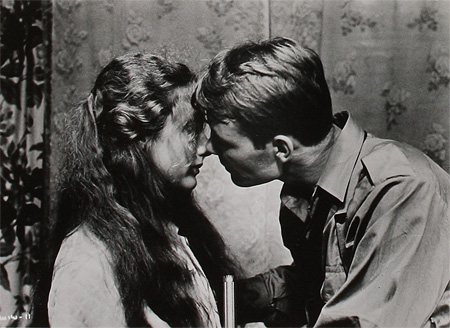Reviews include M3GAN 2.0, Familiar Touch, and I’m Your Venus.
It’s National Canadian Film Day!
April 29, 2015
Jack Blum and Sharon Corder have spent the last decade bringing classic and contemporary Canadian films to audiences throughout the country through Reel Canada, their organization.
Their “Films In Our Schools” program organizes micro festivals of films, bringing discussion of Canadian cinema directly into the curriculum. “Welcome to Canada” is particularly fascinating, where new Canadians engage with films from this country within the context of both cultural immersion as well as ESL studies. Their most recent way of trumpeting our national cinema is through National Canadian Film Day. On April 29th, Canadians are encouraged to engage in a bit of uncharacteristic patriotism. The daylong celebration includes screenings, festivals, movie clubs and other events scattered throughout dozens of communities.
Jason Gorber spoke to Jack and Sharon about their passion for their projects, their love of Canadian film, and what they feel makes our cinema unique within the global context of cinema.

Jack, you got your start as an actor in Canadian classics like Meatballs and Exotica. How has your previous life spent in front of the camera changed the way you see these films when you champion them?
Jack Blum: Meatballs got things going and drew a lot of investment into a very favourable tax deal regime. A lot of questionable Canadian movies were made and I was in quite a few of them!
I quickly moved into writing, producing film and television and very shortly after that started working with Sharon. Then, about 10 years ago, we started this really because we were frustrated with how down everybody was down on the industry.
Sharon Corder: We were at a meeting with the new mayor at the time, David Miller. It was with all of the industry big wigs and it was a really depressing meeting. It was 2003 – SARS [time], and tax credits were down. Everyone was talking about these awful depressing things and at one point I just said I’ve always had this fantasy that if we could just take our really well made films out and show them to young people, they’d really like them.

JB: We brought a committee of people together but of course a start-up is a start-up. We wanted to see it happen, so we made it happen, and here we are 10 years later.
SC: It was an accident.
Accidents are sort of endemic to Canadian cinema. So many of our great films have been accidents. And so many films that tried to be masterpieces were complete failures. As a critic, we get to be snarky, but you guys both have personal connections with a lot of these Canadian filmmakers and also have a responsibility to present them in a wider canvas. Where do you guys draw the line between making quality or critical assertions about these films versus simply nationalistic ones?
SC: That’s a really good question. We have a pretty rigorous system that we’ve developed haphazardly over the years. First of all, the films have to pass muster with us. Now, for me, my tastes are pretty catholic in the small “c” sense. I like a good Men with Brooms and I like a good Exotica. I like a good film and it can be light and funny, it can be serious. It can be a great doc. I just ask that it be a quality.
JB: We started the program very much focused in high schools and on young people. That gave us a kind of a useful filter: whether we liked the film or not, the criteria was that we had to have a chance at showing them something they would like. We didn’t want them to feel they were eating broccoli, and showing them films that they didn’t like wouldn’t be doing any good.
SC: It was a big learning experience to see what played, in the test screenings. In the beginning, we sat in the room with them and it was really instructive.
Let’s get specific – Are you guys showing them Goin’ Down the Road and they’re not getting anything out of it?
JB: No, like The Rowdyman. It plays like a silent film to them. The pacing, the cinema grammar of it – we love that movie, but they wouldn’t go for it.
SC: I Heard the Mermaids Singing. I thought this is still so fresh they’ll like it, but they didn’t.
JB: Even in the 10 years we’ve been doing this, the cinematic language has changed quite dramatically. We started off fighting a stigma where I don’t know if people thought that Canadian films were urban and arty or Canadian films were rural and whatever or they were documentaries. Lots of people seemed to have the idea that a Canadian film could only be one thing. Our aesthetic going forward was that there’s a lot of different kinds of Canadian films and more than likely something that you will like if you take the opportunity to pay attention.
What, then, would you consider to be the definitive Canadian film?
JB: We have a list of maybe 10 that I can be pretty sure any teenage audience anywhere will like. Sometimes I’ve been very surprised by something that they’ll end up loving, but no, that’s the great thing about it. It really is diverse. To understand that evolution of it all, we moved from high school students to include new Canadians through the “Welcome to Canada” program. This was at the request of educators. Those proved to be incredibly powerful screenings.
Could you be specific about the types of films and the titles that you’re showing to showcase their new country?
JB: They work with the catalogue that we have, they choose the films that they want to see. The last one in Toronto at the Lightbox, they chose The Grand Seduction, Breakaway and The Whale. Filmmakers come and talk to them and they have dialogue afterwards. It’s really struck us how emotional the audience gets at being included in Canadian culture.

SC: And we get emotional too! It reflects so much back to us what we don’t normally see about ourselves. It’s 1000 new Canadians sitting in the Lightbox experiencing Canadian culture, experiencing Canadian stories and some of them cry.
JB: It shows us how important this is, how important these stories are, how much it helps them understand the country.
It’s not so much about [picking films] from a critical point of view determining a canon. TIFF is doing that and they’re doing a great job of it, getting everyone to send in their lists. There are great arguments to have about that stuff, which we like having as much as anybody.
But the grounding is given that we have a population of people who are very unfamiliar with the work we do and the stories we tell here. We have to think in terms of starter films. We look at these things with an eye to will this work to someone who has never seen a Canadian film and never heard of a Canadian film before? Will this work? That’s how we put our program together.
There are a lot of really fine films that we don’t show simply because we feel that you have to be introduced to the idea, you have to get a little bit of a grasp of the different approach, the different sensibility. You have to find your way through what you like in all of it, and then you can work your way through to some of the more, some of the offerings that are further outside of the mainstream.
Let’s again try to talk about the different sensibilities. Do you guys think that there’s a unique voice, even if it’s not a shared or homogenous voice, but a generally unique voice between Canadian production of cinema and other countries that are making films?
SC: I’ll tell you what the kids tell us because we get evaluations back from them by the thousands. They often say, and this is not a rare comment at all, that they like them better than Hollywood films having never seen anything but Hollywood films in their lives. They find them more honest, more real, more like the life they see around them.
JB: They say things like I think the difference is that in Canada, they probably spend more time on the script. This is what the kids tell us.
SC: That it’s more a story about people that they see as opposed to special effects.
But you’ve seen more Canadian films than many people in this country, and then you’ve seen a lot of international films. Is there anything that’s tangibly Canadian about what our filmmaking is doing, or is it the contrast between independent and non-independent cinema?
SC: One of the things that I can tell almost immediately is that there’s a lot of diversity on screen. And I can pretty much tell you that if there’s a lot of diversity, it’s not likely an American independent film. Americans have a film that’s a black film or that’s an East Indian film, but we will have a film where there’s all kinds of faces in there that nobody comments on. That’s something that is different. There is a point of view that is Canadian. We’re quirkier; that works for some films.
JB: There are two streams for me from which Canadian sensibilities spring. One has to do with realism, it’s grounded in documentary and gives light to cinema verité and gives light to a real interest in stories about people surviving in one way or another and getting on with each other in a real way. [They’re] less interested in physical action, less interested in spectacle, more interested in people. That’s a long standing tradition in literature, in visual art and in cinema.
SC: Much less interested in fantasy.
JB: Yeah, and then, there is another stream of Canadian work, not just cinema, that has to do with the marginal and the outside. That can be reflected as aesthetic sensibility like Guy Maddin or an interest in marginal characters and eccentricity. So I think each of those things reflect in a fundamental way some stuff about Canadian aesthetic
On April 29th, we have National Canadian Film Day. How did that come about?
JB: The first National Canadian Film Day was the end of April 2014, so it was done on about 10 weeks’ notice, and the thing that pleased us was how fast people said yes. In that first year, we had 44 communities, 70 screenings.
SC: We all had this idea that, really, the people who like Canadian film are this bunch of hipsters in big urban centres. This was across the country in tiny little towns. It amazed us!
Were you showing the same film in every location?
SC: No. They get to choose.
JB: It’s always about the people screening them choosing what they want to show.
SC: Sometimes they’re screening a local film, sometimes they’re screening a comedy, sometimes they’re screening art films, sometimes they’re screening something experimental.
JB: A classic, a new release.
SC: It’s up to them. We help inspire them, we help them do all the stuff, but they choose it. This year, it’s more than doubled, we have over 160 screenings across the country.
JB: The broadcasting industry is often cranky about the fact that they don’t get broadcast support for showing Canadian movies. All the broadcasters are showing Canadian movies on National Canadian Film Day.
Could you talk about the diversity of titles?
JB: There are too many for us to keep in our heads, but name a movie and it’s likely to be being screened.
SC: The most popular film this year isn’t a big surprise, it’s The Grand Seduction. I think about 17 screenings across the country. Mommy is in several places. This year, we’re having our first foray into Quebec in French. They’re going to be screening Café de Flores downtown in Montreal.
You talk about the break into the French Canadian market with Montreal, but if you could also talk about the Aboriginal community, particularly up North. What their embracing of Canadian National Film Day is.
SC: We’re doing great things with them. I think we’ve got 7 or 8 aboriginal screenings specifically. In Yellowknife, we’re doing it in association with ImagiNative and WAMP.
Imagine you’re holding your own National Canadian Film Day and you’re having friends over to watch a movie, give me the one movie you would show this year?
SC: You can’t do that to me! [Laughs.]
JB: There really are a lot that I love. We just went through this with TIFF where we all sent in our top 10.
I’ll tell you one movie that I put on my [list] because I don’t want it to be forgotten because I think it’s such a brilliant thing, and that’s John and the Missus by Gordon Pinsent. I just love what that film does, I think it’s deeply Canadian, I don’t think anyone else was doing anything like that at the time.
SC: And it’s kind of forgotten.
JB: It’s dropped out and I think it really needs to be remembered.
SC: So I would pitch Wedding in White by Bill Fruet – it is gritty and real and dark in a way and it’s so deeply Canadian of a time that certainly none of us have experienced. I think it’s an amazing film starring Carol Kane. Almost no one I know has ever seen it.

How much of a role does showcasing these films play in terms of the preservation of these Canadian films?
JB: What it’s about is making sure the films don’t disappear.A lot of these great films were made before digital, so they don’t exist on DVD, and if we can kind of keep the idea of them alive, then hopefully that will help to motivate some others.
SC: Since we started, we did strike our own DVDs of Highway 61 and Double Happiness, there were no DVDs of those. There are now, but there weren’t then. We’ve made what we call a starter list – It’s about 110 films – It doesn’t matter who you are, there’s a film in there for you. It’s very disturbing to us looking at that list to see how many films we can’t find anywhere.
These are essential films. These are films everybody should see.
Canada does not have the equivalent of the American Library of Congress for their films, correct?
JB: They don’t. And even the American Library of Congress is not keeping up. The Academy, which does a lot of preservation work is not keeping up, it’s a problem. It is really acute in Canada because these films did not have the opportunity in their day to penetrate the culture so they first have to be revived and rediscovered before anyone will even think about preserving them.
What do you see for the future? You guys are continuing to expand and tell the tale of Canadian cinema to a national audience, are you planning at all on showcasing Canadian film to an international audience?
JB: I will very elliptically say that we have some ideas for Canada 150 in 2017. I don’t want to go on about it, but there’s potential to do something pretty large and that’s what we’re talking about in that regard when we’re talking internationally.
SC: The thing is, this thing has grown in ways we never predicted. I think we would just sound foolish if we said no to anything in the future.
Why not celebrate National Canadian Film Day on April 29 by watching your favourite Canuck film of your choosing, eh?



